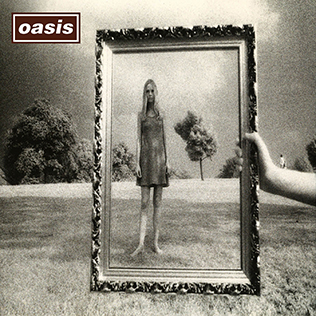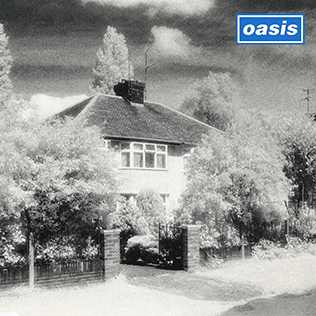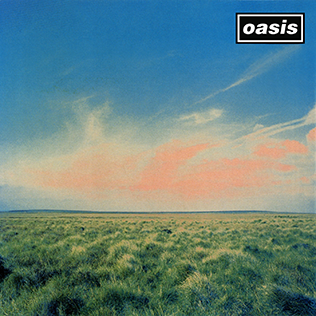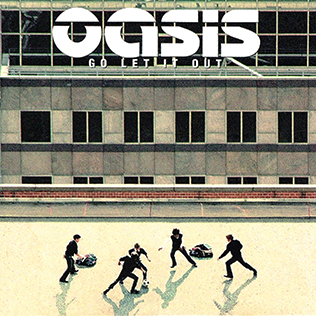See also
- "Stop the Clock", a 2019 James Blunt song from Once Upon a Mind
Stop the Clocks is a 2006 greatest hits album by Oasis.
Stop the Clocks may also refer to:

Oasis were an English rock band formed in Manchester in 1991. Originally known as the Rain, the group initially consisted of Liam Gallagher, Paul Arthurs (guitar), Paul McGuigan and Tony McCarroll (drums). Liam's older brother Noel later joined as a fifth member, finalising the group's core lineup. During the course of their existence, they had various lineup changes, with the Gallagher brothers remaining the only staple members.

"Wonderwall" is a song by English rock band Oasis. It was written by Noel Gallagher. The song was produced by Gallagher and Owen Morris for the band's second studio album (What's the Story) Morning Glory?, released in 1995. According to Gallagher, "Wonderwall" describes "an imaginary friend who's gonna come and save you from yourself".

"Live Forever" is a song by English rock band Oasis. Written by Noel Gallagher, the song was released as the third single from their debut album Definitely Maybe (1994) on 8 August 1994, just prior to that album's release. Gallagher wrote the song in 1991, before he joined Oasis.

"Whatever" is a song by the English rock band Oasis. Written by the band's lead guitarist, Noel Gallagher, it was released on 18 December 1994 as the band's first non-album single. A subsequent lawsuit awarded a co-writing credit to Neil Innes.

"Lyla" is a song by the English rock band Oasis. It was released on 16 May 2005 as the first single from their sixth studio album, Don't Believe the Truth (2005). "Lyla" was the band's first single following the departure of their long-time drummer Alan White, and replaced by Ringo Starr's son and the Who drummer Zak Starkey as an additional drummer of the band.

"Supersonic" is a song by English rock band Oasis, released as their debut single on 11 April 1994. It appeared on their debut studio album, Definitely Maybe (1994). The single reached number 31 on the UK Singles Chart, two on the UK Independent Singles Chart and 11 on the US Billboard Modern Rock Tracks chart. It also reached the top 40 in Ireland, Scotland, France and New Zealand.

"Some Might Say" is a song by English rock band Oasis. It was released as the first single on 24 April 1995 from their second studio album, (What's the Story) Morning Glory? (1995). The song was written by the band's lead guitarist Noel Gallagher. "Some Might Say" provided Oasis with their first number one on the UK Singles Chart and reached the top 10 in Finland, Iceland, Ireland and Sweden. The song is also the last to feature all five original members, as original drummer Tony McCarroll was fired shortly after the song's release.

"Songbird" is a song by English rock band Oasis from their fifth studio album, Heathen Chemistry, and is the first single by Oasis written by vocalist Liam Gallagher. Released on 3 February 2003, the song reached number three on the UK Singles Chart, number two on the Canadian Singles Chart, and the top 10 in Ireland and Italy. During an interview with The Matt Morgan Podcast, Liam's brother and bandmate Noel Gallagher called the track a "perfect" song.

"Go Let It Out" is a song by English rock band Oasis, written by the band's lead guitarist, and chief songwriter, Noel Gallagher. It was released on 7 February 2000 as the first single from their fourth studio album, Standing on the Shoulder of Giants (2000), as well as their first following the departure of rhythm guitarist Bonehead and bassist Guigsy. The song peaked at number one on the UK Singles Chart and was later certified Gold for sales and streams exceeding 400,000. It also reached number one in Ireland, Italy, and Spain, as well as on the Canadian Singles Chart.

"Stop Crying Your Heart Out" is a song by the English rock band Oasis. The song was written by Noel Gallagher and produced by Oasis. It was released in the United Kingdom on 17 June 2002 as the second single from the band's fifth studio album, Heathen Chemistry (2002). In the United States, it was serviced to radio several weeks before its UK release, in May 2002. Liam Gallagher is the lead vocalist on the track, with Noel on backing vocals.

"Morning Glory" is a song by the English rock band Oasis, written by Noel Gallagher and released on the band's second album (What's the Story) Morning Glory? in September 1995. It was given a commercial single release only in Australia, New Zealand, and Japan, and it was also a radio single in the United States and Canada. In North America, it was the first song of the album to receive significant airplay, although primarily at alternative rock radio stations, as "Some Might Say" and "Roll with It" had not achieved as such.

"Champagne Supernova" is a song by English rock band Oasis, written by Noel Gallagher. It is the closing track on the band's second studio album, (What's the Story) Morning Glory? (1995), and was released as the sixth and final single from the album in Australia, France, and New Zealand on 13 May 1996. The Jam frontman Paul Weller appears as a guest guitarist and backing vocalist on the track. A music video for the song, directed by Nigel Dick, was released in 1996. The single was not released in the UK.

"Acquiesce" is a song by English rock band Oasis, written by Noel Gallagher. The song originally appeared as the B-side to Oasis' first UK number-one single, "Some Might Say", in 1995. Its popularity led to it being included on the B-sides compilation album The Masterplan, released in 1998, after being voted for inclusion by fans of the band on their official website.
"Stop the Clocks" is a song by English rock band Noel Gallagher's High Flying Birds. Written by guitarist and vocalist Noel Gallagher in 2001, the song was originally recorded for the Oasis album Don't Believe the Truth in 2004, but was removed from the final track listing. When the band released a compilation of the same name, it was rumoured that the song would appear as a bonus track on the album, but as of 2009 the song remained unreleased. A studio performance of the song, believed to be dating from the Don't Believe the Truth recording sessions, as well as a live version performed in May 2003, were leaked onto the internet on 6 May 2008 by an Oasis fansite. On 6 July 2011, it was announced that "Stop the Clocks" would finally be released on Noel Gallagher's debut solo album, Noel Gallagher's High Flying Birds.

The discography of the English rock band Oasis consists of seven studio albums, two live albums, five compilation albums, six video albums, one extended play, twenty eight singles which includes one double single, nineteen promotional singles and thirty-six music videos. As of 2022, the band have sold 75 million records worldwide, and been cited by Guinness World Records as the most successful act in the United Kingdom between the years 1995 and 2005. Oasis had 22 consecutive UK top 10 hits between 1994 and 2008. Oasis was formed in 1991 by vocalist Liam Gallagher, guitarist Paul "Bonehead" Arthurs, bassist Paul "Guigsy" McGuigan and drummer Tony McCarroll – they were later joined by guitarist and songwriter Noel Gallagher. The band signed to Creation Records in May 1993 and released their debut single "Supersonic" the following year; it peaked at number 31 in the United Kingdom. Follow-up singles "Shakermaker" and "Live Forever" became UK top 15 hits, with the latter also attaining success in the United States. Definitely Maybe, the band's debut studio album, topped the UK Albums Chart and went on to be certified eight times platinum by the British Phonographic Industry (BPI).
"The Masterplan" is a song by English rock band Oasis. It was written by lead guitarist Noel Gallagher and originally released on 30 October 1995 as a B-side to the single "Wonderwall".
"Half the World Away" is a song by English rock band Oasis. It is well known as the theme tune to the popular BBC sitcom The Royle Family.

Stop the Clocks is a compilation album by English rock band Oasis. It was released on 20 November 2006 by Big Brother Recordings. The "retrospective collection" is an 18-track double album with the featured songs chosen by Noel Gallagher. It went 5× Platinum in the United Kingdom.

"Slide Away" is a song by the English rock band Oasis, taken from their debut studio album Definitely Maybe (1994). It was written by lead guitarist Noel Gallagher and serves as the tenth track on the album.

"Don't Look Back in Anger" is a song by English rock band Oasis. It was written by the band's guitarist and main songwriter Noel Gallagher. The song was produced by Gallagher and Owen Morris. Released on 19 February 1996 as the fifth single from their second studio album, (What's the Story) Morning Glory? (1995), it became Oasis's second single to reach number one on the UK Singles Chart, earning a quintuple-platinum sales certification in the UK. It was the first Oasis single with lead vocals by Noel, who had previously only sung lead on B-sides, instead of his brother Liam. Noel would later sing lead vocals on six other singles.